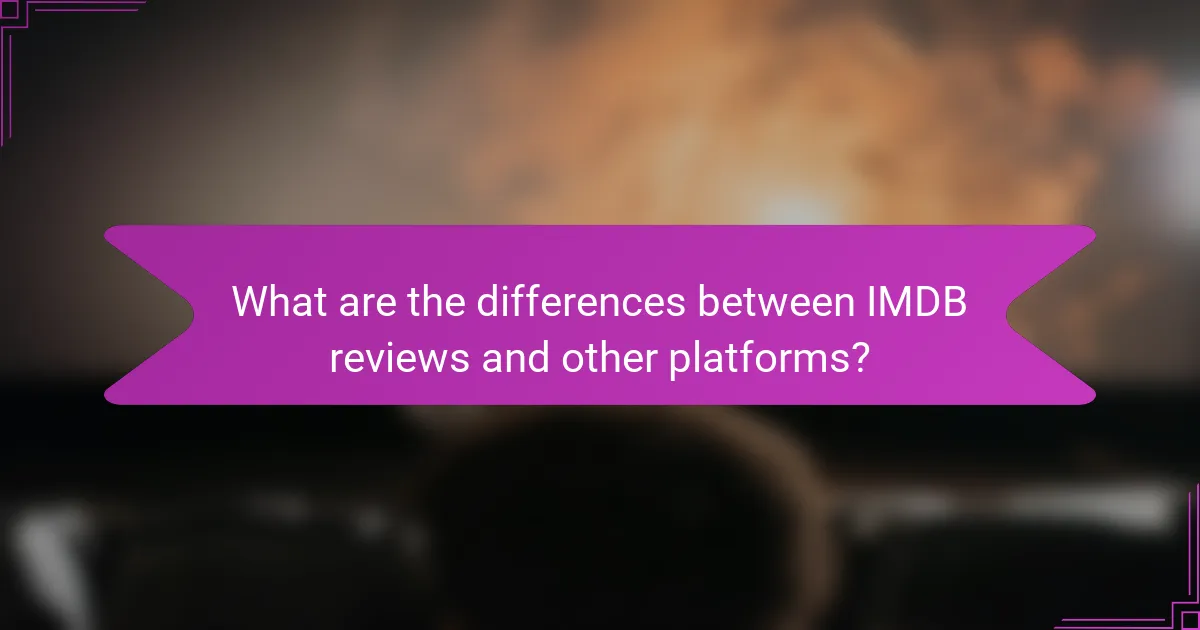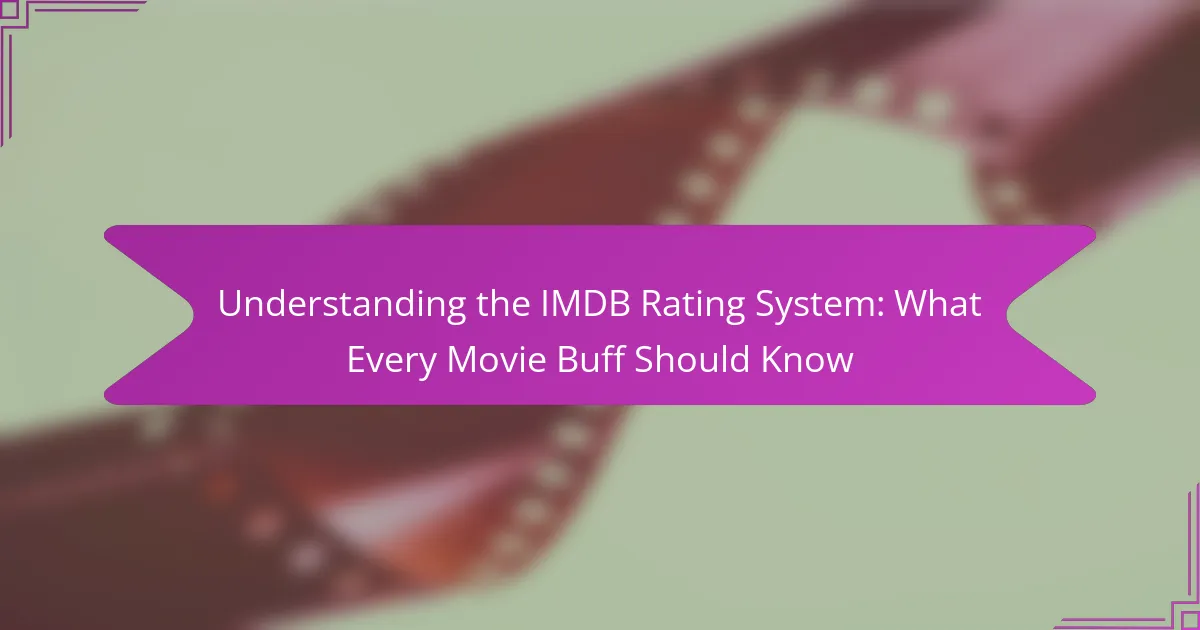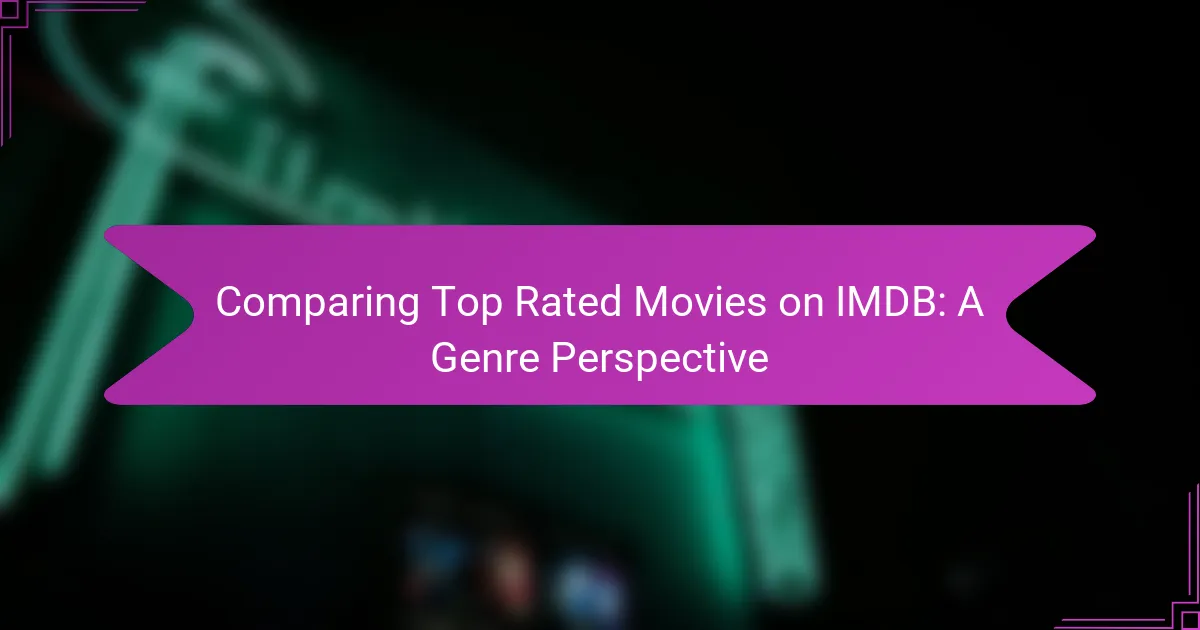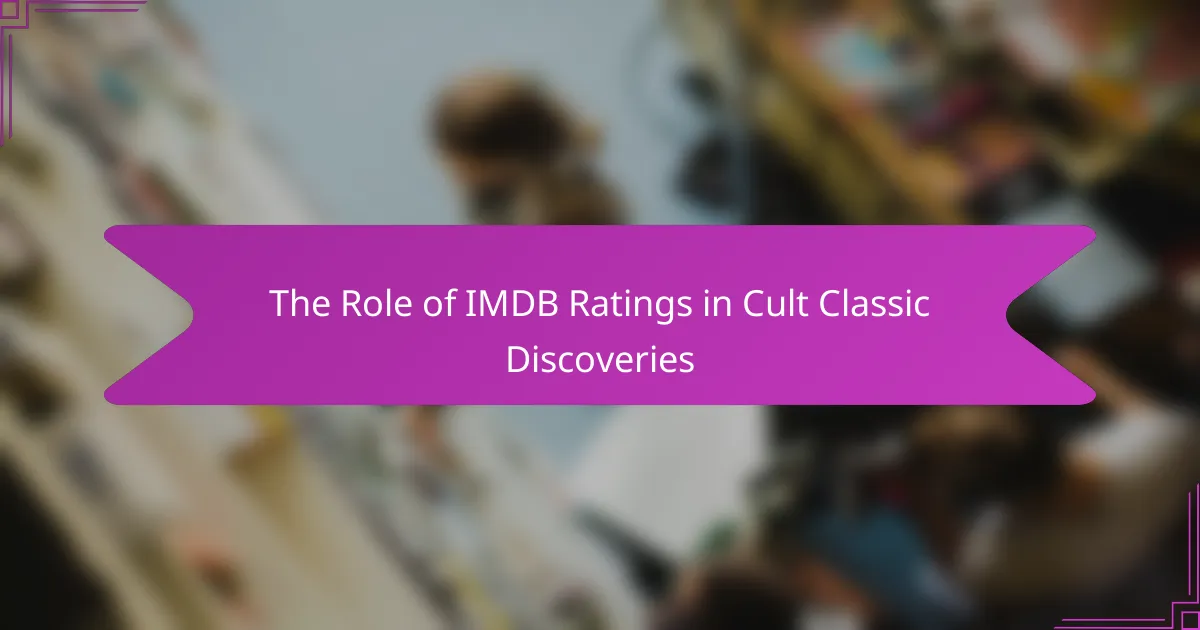Exploring the best IMDB movie reviews for critically acclaimed films reveals the elements that elevate these works to masterpiece status, such as unique storytelling and exceptional character development. These reviews, drawn from both critics and audiences, offer valuable insights into a film’s impact and significance, guiding viewers in their movie selections. With ratings often exceeding 8.0, these films are celebrated for their artistic excellence and widespread acclaim.

What are the best IMDB movie reviews for critically acclaimed films?
The best IMDB movie reviews for critically acclaimed films often highlight the unique storytelling, character development, and cinematography that set these movies apart. These reviews provide insights from both critics and audiences, helping viewers understand the film’s impact and significance.
Top-rated films on IMDB
Top-rated films on IMDB typically include classics and modern masterpieces that have received widespread acclaim. Examples include titles like “The Shawshank Redemption,” “The Godfather,” and “Schindler’s List,” which consistently rank high due to their exceptional storytelling and performances.
When exploring top-rated films, consider looking at their IMDB ratings, which are often above 8.0 out of 10. These ratings reflect the collective opinions of both critics and audiences, providing a reliable gauge of a film’s quality.
Notable critic reviews
Notable critic reviews often provide in-depth analysis and context for critically acclaimed films. Renowned critics from publications like The New York Times or Variety may highlight specific elements such as direction, screenplay, and acting that contribute to a film’s success.
For instance, a critic might praise a film for its innovative narrative structure or compelling performances, offering readers a deeper understanding of what makes the film noteworthy. These reviews can be found on IMDB alongside user ratings, giving a balanced perspective.
Audience feedback trends
Audience feedback trends on IMDB reveal how viewers perceive critically acclaimed films over time. Common themes in audience reviews often include emotional resonance, relatability of characters, and overall enjoyment of the film’s pacing and visuals.
It’s useful to look for patterns in audience ratings and comments, as they can indicate whether a film’s acclaim is widely shared or if it resonates more with specific demographics. Pay attention to the number of reviews and the overall sentiment expressed, as this can guide your viewing choices.

How do IMDB reviews influence movie selection?
IMDB reviews significantly impact movie selection by providing potential viewers with insights into the film’s quality and reception. These user-generated ratings and comments help audiences gauge whether a movie aligns with their preferences and expectations.
Impact on viewer decisions
Viewer decisions are often swayed by IMDB reviews, as many people rely on ratings to determine which films to watch. A high rating can attract viewers, while a low score may deter them. For instance, films with ratings above 7.0 are generally perceived as worth watching, while those below 5.0 might be skipped.
Additionally, detailed reviews can highlight specific elements like acting, direction, and storyline, which help viewers make informed choices. This feedback loop encourages filmmakers to consider audience preferences in their projects.
Correlation with box office success
There is a notable correlation between IMDB reviews and box office success. Films that receive positive ratings often see higher ticket sales, as audiences are more likely to choose movies with favorable reviews. For example, a film rated above 8.0 on IMDB may achieve significant box office returns compared to those rated below 6.0.
Moreover, strong reviews can lead to increased word-of-mouth promotion, further boosting a film’s visibility and revenue. Filmmakers and studios often monitor IMDB ratings closely to adjust marketing strategies and gauge audience reactions post-release.

Which films have received the highest ratings on IMDB?
The films that have received the highest ratings on IMDB are generally considered masterpieces in cinema, often showcasing exceptional storytelling, direction, and performances. These films typically maintain ratings above 8.0, reflecting widespread acclaim from both audiences and critics alike.
List of top 10 IMDB films
As of now, the top 10 films on IMDB include classics and modern masterpieces. Notable entries often feature titles like “The Shawshank Redemption,” “The Godfather,” and “Schindler’s List.” These films not only have high ratings but also significant cultural impact.
- The Shawshank Redemption
- The Godfather
- The Dark Knight
- 12 Angry Men
- Schindler’s List
- The Lord of the Rings: The Return of the King
- Pulp Fiction
- The Good, the Bad and the Ugly
- Fight Club
- The Lord of the Rings: The Fellowship of the Ring
Genres of highly rated films
Highly rated films on IMDB span various genres, with drama, action, and thriller often dominating the list. These genres tend to offer compelling narratives and strong character development, which resonate well with audiences.
Additionally, genres like science fiction and fantasy also feature prominently, as they often push the boundaries of storytelling and visual effects. Films like “Inception” and “The Lord of the Rings” series exemplify this trend, blending imaginative plots with high production values.

What are common themes in IMDB movie reviews?
Common themes in IMDB movie reviews often revolve around storytelling, character development, and cinematography. Reviewers frequently express their opinions on how these elements contribute to the overall viewing experience, highlighting both strengths and weaknesses.
Recurring critique elements
Many IMDB reviews focus on specific critique elements such as plot coherence, pacing, and character arcs. For instance, a well-received film might be praised for its tight narrative and engaging characters, while a poorly rated film may be criticized for a convoluted plot or lack of character depth.
Additionally, technical aspects like cinematography and sound design often come under scrutiny. Reviewers might mention how effective camera work enhances the emotional impact of a scene or how a compelling score elevates the film’s atmosphere.
Viewer sentiment analysis
Viewer sentiment analysis of IMDB reviews reveals a spectrum of emotions, ranging from enthusiasm to disappointment. Positive reviews typically highlight memorable performances and impactful storytelling, while negative reviews often express frustration over predictable plots or underdeveloped characters.
Understanding viewer sentiment can be aided by looking at the overall ratings and the language used in reviews. For example, films with high ratings usually feature a higher proportion of positive adjectives, whereas lower-rated films may contain more critical phrases and complaints.

How to analyze IMDB reviews effectively?
To analyze IMDB reviews effectively, focus on identifying patterns in user feedback and distinguishing between subjective opinions and objective critiques. This involves looking at both the overall ratings and the specific comments to gauge the film’s strengths and weaknesses.
Key metrics for review analysis
When analyzing IMDB reviews, consider key metrics such as the average rating, the number of reviews, and the distribution of ratings. A film with a high average rating but few reviews may not be as reliable as one with a moderate rating and a large number of reviews.
Look for trends in the comments, such as recurring themes about the plot, acting, or cinematography. For instance, if many reviewers praise the cinematography but criticize the pacing, it highlights specific areas of interest.
Tools for tracking reviews
Utilize tools like IMDB’s own rating system, Rotten Tomatoes, or Metacritic to track reviews across platforms. These tools often aggregate user scores and critical reviews, providing a broader perspective on a film’s reception.
Consider using spreadsheet software to organize and analyze data from reviews. You can create columns for different metrics, such as ratings, review counts, and key themes, making it easier to visualize trends over time.

What are the differences between IMDB reviews and other platforms?
IMDB reviews primarily focus on user-generated content, allowing viewers to share their personal opinions on films. In contrast, other platforms like Rotten Tomatoes and Metacritic aggregate critic reviews and provide a more curated perspective on a film’s quality.
Comparison with Rotten Tomatoes
Rotten Tomatoes emphasizes a binary rating system, categorizing films as either “fresh” or “rotten” based on the percentage of positive critic reviews. This system can simplify decision-making for viewers, but it may overlook nuanced opinions found in IMDB reviews.
While IMDB allows for detailed user reviews and ratings on a scale from 1 to 10, Rotten Tomatoes focuses on consensus among critics. This means that a film with a high critic score on Rotten Tomatoes might not resonate with general audiences, as seen in films that critics praise but viewers rate poorly.
Differences from Metacritic
Metacritic uses a weighted average to compile scores from critics, providing a single score that reflects the overall critical reception of a film. This method contrasts with IMDB’s user-driven ratings, which can be influenced by passionate fans or vocal detractors.
Additionally, Metacritic includes a user score that is also aggregated but is less prominent than the critic score. This dual approach can offer a more balanced view of a film’s reception compared to IMDB, where individual reviews can vary widely in tone and detail.

How do IMDB ratings affect film awards?
IMDB ratings can significantly influence film awards by shaping public and industry perceptions. High ratings often correlate with increased visibility and credibility, which can enhance a film’s chances of receiving nominations and wins at prestigious awards like the Oscars and Golden Globes.
Influence on Oscar nominations
Oscar nominations are heavily influenced by a film’s IMDB rating, as these ratings often serve as a barometer for quality. Films with ratings above 7 or 8 are generally more likely to be considered for nominations, as they attract attention from both critics and audiences alike.
Moreover, industry professionals frequently reference IMDB ratings during the nomination process. A strong rating can help a film stand out in a crowded field, making it a more appealing choice for Academy voters.
Impact on Golden Globe recognition
Similar to the Oscars, Golden Globe recognition is often swayed by IMDB ratings. Films that achieve high ratings tend to generate buzz, which can lead to nominations in both the drama and comedy categories.
Additionally, the Hollywood Foreign Press Association, which votes for the Golden Globes, considers audience reception reflected in IMDB ratings. A film with a solid rating is more likely to be viewed favorably, increasing its chances of winning or being nominated.



